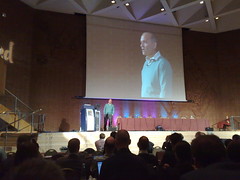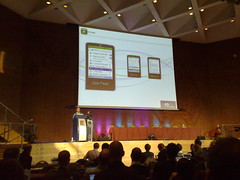Future of Mobile: Panel Discussion
November 17, 2008 | Comments Future of Mobile: Panel Discussion
Future of Mobile: Panel Discussion
Panel discussion:
Dan Appelquist, Vodafone
Mark Curtis, Flirtomatic
Alfie Dennen, Moblog
Justin Davies, Twenty10
Carl Uminski, Trutap
James Body, Truphone
Sam, A.N.Operator
Q: Carl, where did you get your jacket?
A: !
Q: For application developers: where were we 2-3 years ago, what's changed, what's good, what's bad?
MC: You can advertise on mobile. There's a large audience to reach on the mobile, who weren't there 2 years ago. We ran our first ads on Admob in August 2006, saw an attractive cost of acquisition, but low volumes of users. Just after xmas 2006 we ran our first ads on operator portals and got 3.5k users in 3 hours - and they're good users, they spend money with us.
Q: And you Alfie?
AD: Advertising has made a difference, particularly if you don't have a relationship with an operator. Users aren't as afraid as they were of going off-portal.
Q: Justin/Carl, are applications still a dark art?
JD: J2ME lets you go quite a long way across the board in handset support. Java implementations are getting better but there are still problems. Applications now do work on handsets - a year ago VCs didn't like the idea of them, they preferred sites, but now people understand them better. Android, Apple have launched marketplaces and people are now used to them. From a UE point of view an app lets you do things a web site just can't do.
Q: How have emerging markets reacted, Carl?
CU: They're often not 3G users. We're finding customers with good connections and data rates, they're very cheap to use. We use optimised protocols to avoid bill shock. Also handset manufacturers and operators like applications.
Q: James, has the iPhone changed much for you?
JB: The App store has been a big success. We were the first VOIP app in the App Store, and did very well out of that.
AD: Doesn't it take us back a bit to have these closed, partitioned areas where commerce takes place? Won't discovery suffer?
JB: The Apple system isn't perfect but there's a fair chance an app will work if you get it through there.
Q: Will the application store model ever be mass market?
JD: It already is.
JB: We generate more revenue from iPhone users than Symbian users
DA: The App Store has also debunked the idea that real users don't want to use applications. The prevailing wisdom have been that applications were for the nerds.
JB: It's more about people not being told what they can buy by operators.
MC: It doesn't make much difference whether it's operators or Apple telling customers what they can download. It's more about how users will discover you, and thinking about how it'll happen in a years time once the fuss around the iPhone store has gone away. It's easy to get in the top 10 now, outside of that you're in the long tail - so where's the discovery then?
Q: Are you familiar with the UK operators and their developer services? Vodafone Betavine, O2 Litmus, Orange, T-Mobile.
DA: It's great to see O2 coming to the table. O2 Litmus is different from Betavine.
Q: Sam?
Sam: Operators have some value to add: identity, location, and billing. Location is being eroded because they didn't do anything with it. Identity is useful (through control of the SIM card). Revenue shares on billing are still very high.
Q: Do you use external agencies?
MC: Yes, but it depends what for. In the last 2 years, an external agency for usability - and it paid for itself twice over.
CU: We use Future Platforms :)
AD: Panelists doing applications: do you see a move towards web-based?
JB: It's going to be a mixture.
Q: How does a company approach Vodafone? Who sites the budget/acceptance of a third party app. How realistic is it for me to get my new application onto phones?
DA: The answer long-term is to use the web as a distribution medium. Vodafone is in a joint venture with China Mobile and Softbank Mobile. Q3 they're launching an app platform with these guys to upload widgets to a single store and have them distributed across all OpCos.
Q: With gaming generating more revenue than movies, why no mention of mobile gaming today?
JB: In the iPhone App store, lots of the popular apps are games.
AD: There's no-one from mobile gaming on the panel.
Q: For a mobile developer starting a new project today, iPhone or Android?
MC: Logically iPhone, cos it's out there and Android isn't.
AD: What he said, in part because it's hard to get onto any portal. If your business doesn't need a complex application, look at XHTML.
DA: You can do more with the web right now, on Android you can use Gears with web apps to get location/local storage. On iPhone you can use PhoneGap to do the same.
JB: We go for the platforms that generate revenue. Number 1 is Symbian, because "quantity has quality all of its own", 2 is iPhone because there are fewer but you generate more revenue. 3 is Blackberry.
CU: When you're looking at social networking, you need Java to get lots of platforms. iPhone and Android don't do J2ME. GetJar does good distribution through their store.
Q: Are iPhone users normobs?
JD: Apart from the people on this panel, yes. It's changed perception of what a mobile can do.
AD: Let's not forget it was broken in so many ways, but it was good at the basics. I don't have much time for it - it's taken us back a bit.
Q: What user numbers are mobile ad servers looking for to place ads?
MC: More than a thousand a day. Depends on whether it's on cost-per-click or CPM. CPM means 20-30k+ users a day before you make an impact. The off-portal market isn't expanding as fast in the UK as we would've liked to have seen. We're very dependent on advertising on operator decks. You need different techniques to milk a cow, a pig, a goat and a chicken.
CU: On location services, most people don't go to that many places: work, pub, gym, home. Because it's in a social context - it's useful. e.g. my friends know where I am if I'm at work.
Q: What's the best way to get new users? Bring them from the web to mobile, or direct to mobile?
JD: Get them on the mobile web, because you know they're already using the net on their phone. You can also filter by device.
Q: Will the most exciting apps come from Silicon Valley or Europe?
DA: India
MC: Europe
AD: Europe
CU: Europe
JB: Europe
Sam: Europe for Europeans, America for US
Q: Future of Mobile is...?
DA: The web
MC: Complexity
AD: One Web
JD: Personalisation
CU: Please cheap data
JB: Freedom
Sam: One web
Q: Android or iPhone?
DA: Android will be to the iPhone what the PC was to the Mac
AD: iPhone will learn from the web, it'll be an even playing field
JD: Android because it'll be on more handsets in emerging markets
CU: There's no comparison. It's Android or Symbian, iPhone is an end-to-end experience, Android is an OS.
JB: Today: iPhone. In 2-4 years, Android's looking good.
Sam: Android on an iPhone
Q: What's your favourite mobile app?
Sam: Twitter
JB: Mobile facebook
CU: Google maps
JD: Google maps
AD: GMail
MC: Google Maps
DA: Koi Pond
Future of Mobile: Doug Richard
November 17, 2008 | Comments Future of Mobile: Doug Richard
Future of Mobile: Doug Richard
When you run software companies in the US, you divide companies into the US and Rest Of World (ROW). Trutap focused on the RROW (Rest of the Rest of the World).
Last year, a load of new users got their first mobile: 7m new people per month in India (that's one Finland per month). 130m new mobile subscribers worldwide last year.
Many of them think they're middle class: they have a purchasing power equated aspirationally to this. We're under the misimpression that the market is either a small wealthy market, or a huge number of third-world users.
It's not all farmers sharing crop prices.
So this is 500m+, disproportionately young consumers. They have fundamentally different quality of life in Mumbai to LA. Luke @ Trutap spent lots of time in India early this year, including dozens of interviews of current, prospective and failed Trutap users. They have the same needs as western kids have today with their iPhone or PC.
In the West, the PC is private; in Mumbai it's public - and data is more expensive in internet cafes than it is via mobile. Expressing yourself via the net becomes harder in these conditions.
In LA, internet usage is primarily PC. In Mumbai, it's mobile.
Needs and aspirations are the same between the two. I believe social networks are a temporary phenomenon on the PC: they belong on the phones. We want to keep up with friends and associates constantly, to meet others: this nirvana is in the offing. Nokia talk about the super-address book, but it's all the same thing. The new emerging middle classes are as large numerically as the whole of Facebook today: so social software isn't done and dusted, it's not all done yet.
Western operators will make conservative choices and adopt a defensive position - Indian operators will be more inclined to do risky stuff as they grow. All these things that people understand the mobile industry has to get over? They'll get over them first in India.
 Internal goal for Trutap 2.0: delivering an iPhone experience to everyone else. Can we do this? No - I don't own an operator, I have slightly less cash. But we can move in that direction.
Internal goal for Trutap 2.0: delivering an iPhone experience to everyone else. Can we do this? No - I don't own an operator, I have slightly less cash. But we can move in that direction.
The iPhone is having a disproportionate impact on the world: in emerging markets it's practically non-existent. But it shows what the future should be.
This will happen where there is capital, opportunity, and a large emerging middle class.
Trutap was a support of a web existence. We support all the worlds IM transports. Dating sites arose on the web independent of social networking; in Japan the two never split.
... shows off Trutap ...
We have an odd and unique time coming - the IT industry has been driven by the US, whilst mobile was driven from Europe. But we need to be sensitive to the fact that much innovation will come from emerging markets.
In a break from our regular programme...
November 11, 2008 | Comments ...I had a lovely weekend out, mostly spent catch up with Aikido folks in the south-east. On Saturday morning Mr Helsby and I took a train (and attendant rail replacement bus service) up to SOAS to train with Sue Smith and the Airenjuku London crowd, in the basement bunker which serves as their little shed.
...I had a lovely weekend out, mostly spent catch up with Aikido folks in the south-east. On Saturday morning Mr Helsby and I took a train (and attendant rail replacement bus service) up to SOAS to train with Sue Smith and the Airenjuku London crowd, in the basement bunker which serves as their little shed.
Then the next morning 8 of us from Airenjuku Brighton drove over to Southampton to pay a visit to the Southampton University club - something we've been meaning to do ever since summer school in Chester this August. The Southampton guys made us feel very welcome, Alex Megann taught a fantastic class with Tom, and we sampled the delights of an indian buffet at Cafe Mumbai afterwards...
...driving back (or rather, being propelled half-asleep in my case: I was in the Land of Nod for the whole journey) just in time for our regular Sunday evening transmission.
Lovely, and not a mobile phone or laptop in sight ;)
And whilst I have your attention, take a look at these rather natty videos done by some aiki/tech lunatics with motion sensors and some interesting visualisation software: beautiful stuff.
Mobile Monday
November 10, 2008 | CommentsIt's a chat-show format! Tim Green hosts.
First up: Mike Short, VP R&D, O2.
TG: How's mobile going to be affected by an economic slowdown?
MS: Anyone in the room feel a slowdown? It's still a growth industry; there's a lot left to do wrt content and applications.
TG: Isn't a discretionary spend on content threatened?
MS: There's bound to be some belt-tightening, but people are going wireless over fixed. We're seeing 38% year-on-year growth. Public sector are starting to show an interest - unheard of a few years ago. Some areas (e.g. some aspects of content) might slow down, but overall growth.
MS: Operators don't want to do content themselves, they want partnerships. They've not been happy w/slow growth of WAP, iPhone has shown that usability stimulates growth.
TG: O2 are not supporting all Nokias because of conflicts (with Ovi?)
MS: Yes, but operator ranges are always limited. We can't stock them all.
Helen Keegan: What's your top tip for what'll be big in the coming year?
MS: More of the same. More mobile/web combinations as web players come into the market.
HK: How can we get web and mobile side of our industry playing together?
MS: Education helps. Events like this help. Trialling things with the customer in mind helps - some web ideas don't fit well.
David Wood, Symbian: Will we seem more of the same delivered more efficiently thanks to companies being more cost sensitive?
MS: Efficiency will come, but we'll start thinking of new ways to do things. How can mobile help in new application areas? e.g. NFC trials with TfL embedding Oyster into handsets.
Mark Curtis, Flirtomatic: Did the NFC trials involve O2 taking 35% revenues, or normal content revenues?
MS: Normal commercial arrangement for Oyster (i.e. no huge revenue share for operators). We won't see a revolution in the next 2-3 years, but rather an increased range of devices to increase utility.
James, Truphone: Your team did well to secure the iPhone. What's the one thing you learned from the iPhone user experience?
MS: The Store - there's a lot of lessons in there as strong as the usability angle; which is why we're setting up O2 Litmus.
Will, D2C: We've battled fragmentation for the last few years, but it's getting worse and there's a trend towards applications. How do you see this moving?
MS: Fragmentation isn't O2's responsibility, but if customers want something new we won't stop them. We have some influence, but they're asking for different things. We're interested in global, not UK-centric standards.
Next up, Russell Buckley from Admob.
RB: iPhone is becoming #1 device worldwide (out of 12m sold worldwide).
TG: What are the form factors for advertising?
RB: CPM graphical banners are UK/US only, much volume comes from outside. 30/70 in favour of graphical and iPhone banners.
TG: How do you see the vocabulary of advertising changing? Banners are form the Internet and a bit lame, after all.
RB: New media tend to borrow from older ones. Same is true of the mobile Internet: we've borrowed formats from digital and this has worked well, but the iPhone lets us do new formats to play to mobile for the first time (e.g. click-to-call, location-based).
TG: How realistic is it to take the iPhone formats and profilerate them across handsets?
RB: Other models (e.g. RIM Blackberry) let us play to strengths of mobile. We're transitioning from old WAP to iPhone type experience, but whether the iPhone is the winner is moot: it's given the rest of the industry a vision.
TB: What about brand-building? Is the Carling iPhone app an advert?
RB: The old model of interruptive advertising is starting to fade. The people having big success (e.g. Jaguar) are more concerned with the overall customer journey.
TB: How many of your advertisers are mobile content/handset companies?
RB: We spoke to them first, if we can't sell to ourselves who can we sell to? The US is more receptive to new adverts/formats, the car sector in particular have taken off.
TB: Where's the line between advertising and marketing?
RB: CRM is untapped and important. Don't cancel my credit card when I spend abroad: send me texts re transactions to save me hassle and make it my responsibility.
Andy Walker, Geomoder: Asks about LBS.
RB: We're prenatal about LBS. We've not cracked delivering messages yet - we've tried LBS alerts via text, sometimes it works and sometimes it doesn't. Mapping shows us the way but it's a huge logistical problem to get this into the heads of the sales force.
Scott Beaumont, Mippin: What can we do to bring better quality brands onto mobile?
RB: I'm global chair of the MMA. P&G want to talk to their "next billion" customers, not the mobile industry... Admob have a lot of inventory in this part of developing world.
James, mJelly.com: Much of your traffic is in India, Indonesia, etc... not that much value to advertisers though. What's going to happen?
RB: Our biggest market is the US; UK is in the top-5. 1.5bn in Indonesia leaves lots of potential: a few clicks will matter (sounds to me like the old "we just need 1% of the market" play to me tho). A click today in the UK/US is worth more than in Indonesia, but for brands wanting to talk to these customers for the first time it's got potential.
Half-time with the Mobile Industry Review team. Fairly harsh slagging to the G1: "it's really shit hardware, but Android is really amazing. The screen is crooked. Good points: browser is nice, stable."
Next: Madhuban from Irini (sp?).
TG:
M: Investors are looking beyond applications to investments in IP rights.
TG: If there's no liquidity in financial markets, can we expect money to flow (in mobile)?
M: Trade buyers are coming from the US, UAE and India.
TG: Are India and China looking to invest outside their home territories?
M: In markets like this you'll see some bargains. Mobile is high-growth and in overdrive. India and the UK have common themes: from an operator POV they're the most competitive markets, but in terms of ARPU they're the opposite: so in one you play a volume game, in the other value-add.
TG: Russell, you've had your share of VC money. How do you feel about the situation?
RB: You've seen the Sequioa "RIP" presentation. Investment now would have been on different terms to a few months back. Cost of doing a startup is much lower now than 10y ago, you can work on a shoestring and build value in the downturn so that when the market recovers you're well positioned.
TG: What companies are you looking at?
M: The fundamentals of investment haven't changed. Using mobile as a means to deliver a piece of technology is interesting; cites example of an Ecuadoran community using mobile without operators, or mobile used as card reader/scanner for couponing.
TG: Some of the technologies are disruptive - doesn't that make for a high risk investment?
M: Yes, good VCs can see opportunities before they become mainstream. Skype etc were disruptive investments.
And now, Bill Thompson, "a hairy man".
BT: I get to play with things and see how they might be useful. Mobile has been the most interesting area for the last 8-9 years. It's like a waterwheel: someone is always drowning, it certainly has it's downside.
BT: I have seen 1 videocall in the wild, in a bar in Barcelona. It reminded me of cable where the cable companies tried to get us to buy TV, when we wanted IP connectivity. All the talk of advertising etc., masks a reality: phones will become Just Another IP Device. Many of the models built around its affordances as a phone will stop being workable and new things become possible. People challenging the status quo of operators etc. will have a difficult time, but will prevail. We will change handsets and expect portability of UI. Portability will bring audience loyalty.
TG: What timeframe for this to be a mainstream consumer choice?
BT: Vested interests tend to decay. As technologies emerge, so do new possibility of making money. Incumbents either self-cannibalise (rare) or die. (He's talking about strategy tax I think). New entrants with nothing to preserve can offer something fantastic - e.g. a handset that clones the UI of your current phone?
TG: If the handset companies become clones and networks become pipes, who are the big forces?
BT: The OS developers (if they're lucky) or the applications and services. It's all IP in the long-term, all bits on a processor. Phones become commodities, but no-one has a "right" to make a profit.
TG: How can Vodafone reposition for this?
BT: Buy a foundry. Make chipsets. Be Qualcomm. Support the multiplicity of handsets in software as well as hardware.
BT: Binge drinking is a side-effect of mobile phones. My daughter will arrange to go out, but not to a venue - just-in-time socialising. Landlords need to offer cheap beer in happy hours to keep customers, hence binge drinking.
Dan Applequist, Vodafone: There's a lot of entrenched cynicism in the industry, that real people don't want these services, preferring hand-holding. What do you say to people who take that view?
BT: Good UI design is like a new sexual partner: revealing him/herself slowly. As you explore you discover new opportunities for pleasure, ideally at minimum cost. I'd like big, thrusting bandwidth.
DA: Where's the balance point between disruption and disrupting yourself out of business?
BT: In next 4-5 years we'll see failed disruptions ("peaked too early"), have their ideas picked up on, giving them an opportunity to build new businesses. The worst thing is that someone large (Google) sees your business as their marketing expense.
TG: What will move people in this direction? Most people still only want voice and text.
BT: Imagine Nokia 8600 running Android. You don't need to give people interfaces today, but you do need to give them platforms which support what they want - so when they want these services, they're there.
RB: Opportunity is for incumbents to be disruptive (e.g. O2).
David Wood, Symbian: On the question of UIs changing according to your mood. Have you seen what QT do?
BT: This is the way things will go - it's a question of how much functionality you reveal to the user and when?
James, Truphone: Network operators annoy me when they tell me what I can do - e.g. the Blackberry Storm with Wi-Fi taken out for Vodafone. I want a phone with everything open.
Enterprising Engineers
November 07, 2008 | CommentsI've just gotten back from a wonderful little event at Sussex University, called Enterprising Engineers.
It's organised the luxuriantly bearded Jonathan Markwell of Inuda, who seems to have mastered the dual skills of fitting 36 hours into the working day and either attending or organising every digital media event in town. The format was good fun: nibbles and booze followed by a 3-person panel taking turns to talk for 10-20 minutes, and taking questions from the audience.
Tonight it was myself, Dan from Angry Amoeba, and Glenn from Madgex - all talking about products.
Dan held forth on his philosophies towards startups, how it's affected his working life, and finished with a demonstration of his product, Tails (a beautifully simple-looking bug tracking system).
Glenn followed up with a roundhouse presentation to the face, giving the back-story to Backnetwork, a product Madgex built to connect folks at events which is nowadays languishing without further development, but nonetheless earning its keep as a tool for bartering in exchange for sponsorship.
And then I wibbled somewhat - for my Macbook decided to crash, preventing me from showing the Ghost Detector video that should have introduced my skit. I rambled on about our experiences launching Ghosty in the US, then Flirtomatic and Twitchr: the unifying theme being the complexity and engineering problems which can be lurk behind even the inane, the lewd, or the playful.
